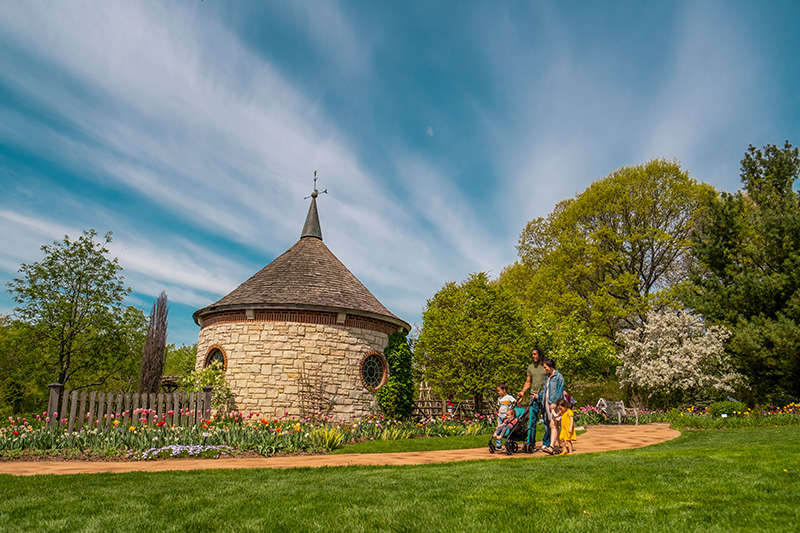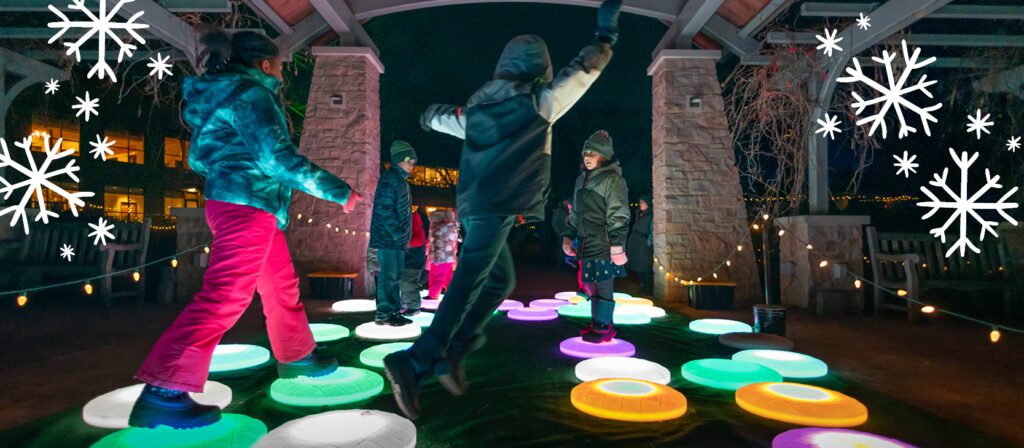“We do not inherit the earth from our parents. We borrow it from our children.” – Moses Cass
The goal of sustainability is to preserve the environment for generations to come. Green Bay Botanical Garden is committed to making earth-friendly choices in our gardening practices and facility choices.
In addition to recycling paper, aluminum, and plastic, any weeds and yard waste that is removed from the Garden by our Horticulture Team is added to a compost pile. A lunchroom compost program also collects food scraps from staff lunches and coffee grounds from the WPS Trellis Gift Shop to reduce the amount of organic waste going into the landfill.
The Schneider Family Grand Garden is a native and prairie grass area with a focus on holistic and native gardening. These plants do not require additional watering during times of drought since they are native to the region and can typically handle our yearly climate.
In the fall, our Horticulture Team cuts back the native perennials, but leaves a third of the stalks or plant matter as a habitat for local wildlife and beneficial insects. The plant matter pieces are also left on the ground to act as a natural mulch.
Green Bay Botanical Garden is also transitioning seldom used turf areas to no-mow seed mixes that require less frequent mowing. As a result, these turf areas require less fossil fuel and can become habitats for insects and other animals.
To help care for our rose collection, our Horticulture Team uses a custom blend organic fertilizer which is a mixture of composted turkey litter, called Sustane, and compost from Purple Cow Organics. We also use integrated pest management, which focuses on natural methods to remove and control insect pests, which limits the amount of pesticides that need to be sprayed. Roses in the Lux Foundation Upper Rose Garden tend to be affected by more insect pests and diseases than other crops so they are monitored closely and only sprayed when absolutely necessary.
Each year, the Garden grows approximately 20,000 annuals from seed. We reuse our horticultural plastic from previous years by sterilizing pots and carry trays each winter. This reuse of materials cuts back on plastic waste.
Weeds in the Garden are controlled mainly by hand pulling. Although tedious, this method eliminates the need for chemicals and tilling, both of which can disrupt the soil ecosystem.
We water the majority of our plants by hand with a watering wand. Although time consuming, this method allows us to use the right amount of water for each plant in the Garden. Automatic systems are unable to account for rain and individual plant needs, so we are saving water and also preventing plants from dying due to over or under watering.
The only areas that are irrigated are sections of turf throughout the upper areas of the Garden and the hostas in the King Shade Garden because of how dry it gets under the canopy of large oak trees.
The Vietnam Veterans Garden is located on a dry hillside with southern exposure which makes it an ideal location for a xeriscape garden. This style of gardening features drought tolerant plants (native and non-native). These hardy plants require less watering, less fertilizing, and less pest prevention meaning water saving of 50-75% as well as a fertilizer- and pesticide-free garden. The native plants, trees, and shrubs also offer a familiar habitat for local wildlife.
The Schneider Education Center features sustainable technologies to help increase air quality, energy efficiency, and waste reduction. The most visible feature is the inverted, V-shape rooftop, which floods more daylight into the building, cutting down on the need for artificial light.
The Stumpf Hobbit House makes a visit to the bathroom fun, but it’s also a model for green building designs. It’s equipped with energy efficient features such as solar light tubes, water efficient toilets and sinks, and energy-saving Dyson air blade hand-dryers. It’s most noticeable feature is being built into the hillside, which minimizes the building’s heating and cooling needs while the green roof lowers storm water runoff and provides habitat for garden critters.
Restrooms in the Schneider Education Center, the Concessions Building, and the Stumpf Hobbit House have toilets with a dual flush option. Dual flush means that each toilet has two flush options to only use the amount of water necessary: one flush that uses 1.1 gallons of water to flush away liquid waste or a heavier 1.6 gallon flush to help dispose of solid waste. Saving ½ gallon of water may not sound like much, but with 150,000 visitors on average each year, this water savings adds up quickly!
Green Bay Botanical Garden believes recycling should be a priority. In all areas of the building, clearly marked recycling bins are located next to every trash can. Our Events Team has also switched to selling water bottles made with aluminum and wooden stir sticks to cut down on plastic waste.
We focus on sourcing local products, promoting hand-made pieces, and cutting our carbon footprint when stocking items in our WPS Trellis Gift Shop. Look for our “made in the U.S.” labels the next time you’re shopping!
Green Bay Botanical Garden is Travel Green Wisconsin certified! The Garden is one of just four certified businesses in Green Bay. We have met many of their requirements that demonstrate we are dedicated to sustainability and environmental health. In fact, we met 75 requirements, well over the required score of 30!
Some of these requirements included distributing info about living sustainably, using fluorescent bulbs instead of incandescent, maintaining a recycling program, using day lighting sensors that reduce the energy used for lighting, installing low flow fixtures, and using organic fertilizers.
At Green Bay Botanical Garden, we not only evaluate all of our new plants throughout the Garden, but we also evaluate specific trial plants and maintain our Magnolia Collection all season long. As the Garden grows, we have become more involved with the horticultural science side of gardening.
In 2021, the Garden dug deeper into the preservation of the magnolias in our collection as part of our disaster preparedness plan. We’re working hard to document the unique species in our collection and ensure we’re replicating these specific magnolias in off-site environments like other botanical gardens.
In 2022, the Garden was involved in two major trialing efforts:
All-America Selections (AAS) Trials
American Rose Trial for Sustainability or A.R.T.S.®
The trials we perform allow our visitors and members to see new plants before they are released – to get them on their purchase list – and to ask local garden centers to supply them. Our trials also allow local garden centers and growers to see the plants perform in a garden setting which may help determine if they are worthy of adding to their garden center’s inventory.
The Garden has 146 magnolias and 122 taxa, and is recognized as a Magnolia Multisite Collection™, the only Plant Collections Network (PCN) collection in the state of Wisconsin. Many of our cultivars represent the work of local magnolia hybridizer, Dennis Ledvina, whose efforts bred magnolias with unique features that can handle our colder spring seasons and bloom longer throughout May and early June.
All-America Selections (AAS) Trials
![]()
![]()
Green Bay Botanical Garden is one of about 80 trial gardens in the United States that test new, never-before-sold varieties of plants for the home gardener. The Garden participates in the ornamental plant trials, comparing breeders’ entry plants against the most commonly grown industry standards of that particular plant. The entry plants are compared and rated against the comparison plants throughout the trial, and then a score sheet is sent into AAS at the end of the evaluation period. Our results are tabulated along with those from the other trial gardens to determine if the entry plant is worthy of an AAS designation. Look for AAS plants and seeds when shopping this season to get proven performers into your garden.
The All-America Selections trial and display beds can be seen behind the Magnolia Grove (Schneider Family Grand Garden) as well as in our Partnership Garden, showcasing recent ornamental and edible winners from the Great Lakes region.
American Rose Trial for Sustainability (A.R.T.S.®)
This trial includes 20 roses in 3 replicated blocks, equaling 60 plants total, which were planted and watered for a few weeks to establish them. After that, the shrub roses received no supplemental water, no fertilizer, no pesticide treatment, and no winter protection. The idea is to find beautiful flowering roses that require very minimal care and are not susceptible to insects and disease. These roses are trialed for two years (after which a new group is planted) and evaluated monthly by our Horticulture Team. The A.R.T.S.® trial is located to the east of the Magnolia Grove behind the Matthew Schmidt Garden (Schneider Family Grand Garden).
Green Bay Botanical Garden is one of 23 national sites in the A.R.T.S.® program. Our data is compiled with other test sites to determine the best sustainable roses for our climate zone (Dfb Humid Continental [Cool Summer] Climate). Look for A.R.T.S.® winning roses in garden centers in the upcoming years.
920.490.9457
info@gbbg.org
2600 Larsen Rd
Green Bay, WI 54303
Be the first to know about our latest news, upcoming events, programs, and more.
©2024 Green Bay Botanical Garden. All Rights Reserved.


Save $10 with the code NEW2024
Join by March 24, 2024.
A donation to the Garden by Dec 31 makes a world of difference. Be part of our growth journey! 🌺


A Garden membership is a meaningful gift for your loved ones to enjoy this timeless treasure and make memories all year long.
Support the Garden and gift a membership today!
Explore nature’s wonders!
Join as a new member by December 3 and receive two Free Daily Admission Passes.


View and bid on hundreds of items like plant containers and hanging baskets, various gift packages, outdoor living items, and so much more.
will be moved indoors with limited seating due to Friday’s weather forecast. Tickets are no longer available. We apologize for any inconvenience!
Due to the snow storm, the Garden will open at 12 pm today (Wednesday, April 3). Stay safe!